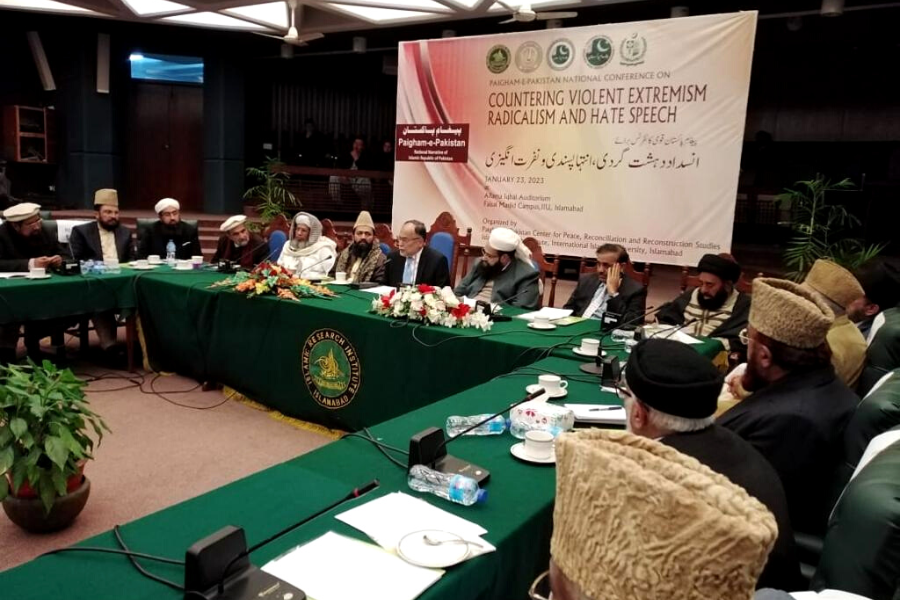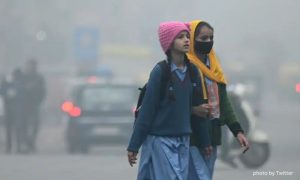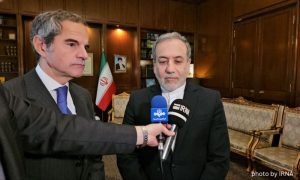ISLAMABAD: While analyzing the current situation and challenges to Pakistan, eminent ulema and religious scholars from across Pakistan on Monday unanimously condemned all forms of terrorism and extremism and called for national unity for the sovereignty and integrity of the country.
Today’s meeting was attended by learned and authoritative religious scholars from all over Pakistan, most of whom had issued the national narrative of “Pegham-e-Pakistan”. This gathering of ulema issued a national statement and fatwa on January 6, 2018, “Pegam Pakistan”.

At the end of the meeting, the ulema issued the following announcement.
- This gathering of Ulema representing all schools of thought believes that the “Paigham-e-Pakistan” which was issued from the President’s House on January 6, 2018, is a reflection of the Qur’an and Sunnah, the constitution of Pakistan and the collective thinking of the nation of Pakistan. This narrative, while analyzing our problems, presents a practical plan by following which not only the goals of establishing Pakistan can be achieved, but also a strong, unified Islamic and democratic society can be established in Pakistan, which is Islamic civilization and the spirituality of civilization, justice and fairness, equality, brotherhood, mutual tolerance and tolerance and balance in rights and duties should be adorned with features. In order to implement this narrative, it is necessary that it be passed by the National Assembly and the Senate and implemented as a policy across the country.
-
- This gathering of scholars believes that it is not right to deny the Islamic status and Islamic basis of the Islamic Republic of Pakistan on the basis of any so-called argument. Therefore, declaring the country or its government, army, or other security agencies as non-Muslims and taking armed action against them is a violation of Sharia and law, and such an act would be considered a serious crime of sedition according to Islamic teachings. This representative gathering of religious scholars believes that the use of force in the name of Sharia enforcement, armed confrontation against the state, sabotage, and corruption, and all forms of terrorism, which our country is facing, are absolutely forbidden and prohibited by Sharia law and fall under the category of sedition. This is causing the weakening of the state, the country, the nation, and the homeland, and all their benefits are reaching the anti-Islamic and anti-national forces. Therefore, the operations carried out by the state to crush them and the action plan formed by the national consensus are correct and should continue to be implemented. If needed, how can they also go?
- In the war against terrorism, people from all walks of life, including the ulema, are standing with the state, the armed forces, the police, and all institutions that establish peace and order, and the people, and the entire nation is a force in this war of national survival. It declares full and unconditional cooperation with Pakistan and other security agencies of Pakistan.
- This congregational message renews Pakistan’s pledge that the armed groups who are engaged in activities against the state in the name of linguistic, regional, religious, and religious identities, all of them are opposing Sharia orders, hence the responsibility of the state institutions. It is necessary to take strong action against all these groups after which these people cannot raise their heads again and immediate, long-lasting, sustainable, and serious efforts should be made for the solution of these groups.
- This representative gathering of religious scholars believes that the method of imposing one’s views on others by force is a violation of the laws of Sharia and a serious crime according to the constitution and laws of the Islamic Republic of Pakistan. Therefore, these types of attitudes should be countered at all levels and strategic, proactive, defensive, social, and economic measures should be taken to counter them.
- This gathering of Ulema believes that extortion by terrorist and sectarian organizations in the name of Jihad is a serious violation of Sharia and law and a serious crime that is affecting business activities in our society, therefore peace-keeping institutions should make serious efforts against these crimes. The main purpose of all educational institutions established in the country is education and training. All public and private educational institutions in the country should not have anything to do with militancy, hatred, extremism, violence, and regionalism. After the release of ‘Paigham-e- Pakistan, there has been a significant improvement in this regard and now the situation of law and order in educational institutions is relatively better. Efforts should be continued.
- The mindset of terrorism and hatred is the enemy of our social peace. The intellectual struggle against this regime is the national responsibility of all institutions and individuals. According to Islamic teachings and the country’s law, writing and speech based on insult, hatred, and extremism against any person, religion or institution are un-Islamic and illegal.
- Schools and schools of thought among Muslims have existed since ancient times and still exist today. Jurisprudence and theoretical studies based on arguments are and will remain a part of our religious and Islamic knowledge capital, but these are the subjects of education and research. There is a violation.
- This gathering of Pakistani Ulemas feels that some so-called Ulemas in other countries have given such statements in support of the narratives and actions of terrorist organizations active against the Islamic Republic of Pakistan and against the security institutions of Pakistan, which are a clear violation of Sharia rules and international law, so this representative gathering of Pakistani scholars and scholars not only condemns this irresponsible act but also demands from the government that this type of non-Sharia and action should be taken against the illegal ones.
- A few days ago, the religious sentiments of one and a half billion Muslims around the world have been hurt by the heinous and shameful act of desecration of the Holy Quran by a right-wing extremist in Sweden, which words are not enough to condemn. The freedom to hurt the religious sentiments of Muslims cannot be given under the guise of freedom of expression. The government of Pakistan and human rights leaders should do their responsibility to prevent such abominable acts.
- Due to the illegal and unethical use of social media, our social values have been seriously threatened, therefore the use of social media to promote anti-patriotism, sectarianism, violence, hatred, and terrorism is discouraged. should go Message: The public, especially the youth, should be trained in the responsible use of social media through summer programs related to Pakistan.

The joint statement was signed by eminent ulema and religious scholars. Ulema and religious scholars who signed the declaration are listed below:
| S.No | Name | Designation/Affiliation |
| 01 | Dr. Qibla Ayaz | Chairman Islamic Ideological Council |
| 02 | Mufti Muhammad Taqi Usmani | President of the Federation of Al-Madaris Al-Arabiya Pakistan |
| 03 | Hafiz Tahir Mahmood Ashrafi | Chairman Pakistan Ulema Council |
| 04 | Mufti Muneebur Rehman | Sadrul-Madaris Ahl-e-Sunnah, Pakistan |
| 05 | Dr. Allama Muhammad Hussain Akbar | Member of the Islamic Ideological Council |
| 06 | Professor Sajid Mir | Amir Central Jamiat Ahl Hadith |
| 07 | Maulana Abdul Khabeer Azad | Chairman, Ruet-e-Hilal Committee |
| 08 | Maulana Mufti Abdul Rahim | President of Jamia Al-Rashid |
| 09 | Qari Muhammad Hanif Jalandhri | General Secretary, Al-Madaris al-Arabiya |
| 10 | Pir Naqibur Rehman | Federation, Eidgah Sharif, Rawalpindi |
| 11 | Hamid Saeed Kazmi | Former Federal Minister for Religious Affairs |
| 12 | Allama Ziaullah Shah Bukhari | Member Islamic Ideological Council |
| 13 | Allama Iftikhar Hussain Naqvi | Former Member, Islamic Ideological Council |
| 14 | Maulana Zahid Al Rushdi | General Secretary, Pakistan Shariat Council |
| 15 | Professor Nabi Bakhsh Jamani | Acting President, International Islamic University, Islamabad |
| 16 | Prof. Dr. Muhammad Zia-ul-Haq | Director General Islamic Research Institute |
| 17 | Maulana Hamid Haqqani | President Jamiat Ulema-e-Islam (S) |
| 18 | Maulana Muhammad Sharif Hazarvi | |
| 19 | Maulana Muhammad Adil Attari | |
| 20 | Mufti Aulis Hazarvi | |
| 21 | Maulana Zubair Fahim | |
| 22 | Qari Bashir Ahmed | |
| 23 | Nadeem Bangash | |
| 24 | Allama Tuaqeer Abbas | |
| 25 | Allama Nasir al-Mahdi | |
| 26 | Mufti Gulzar Ahmad Naimi Pir Syed | |
| 27 | Ali Raza Bukhari | |
| 28 | Dr. Raghib Hussain Naimi | |
| 29 | Pir Khalid Sultan Bahu | |
| 30 | Maulana Imtiaz Ahmed Siddiqui Syed | |
| 31 | Ali Geelani | |
| 32 | Pir Hasan Haseebur Rehman | |
| 33 | Maulana Syed Chirag Din Shah | |
| 34 | Allama Asif Akbar Pir Muhammad Amin Qadri | |
| 35 | Maulana Muhammad Yasin Zafar | |
| 36 | Mufti Muhammad Shafi | |
| 37 | Mufti Maqbool | |
| 38 | Mufti Zubair Yusuf Madani | |
| 39 | Mufti Muhammad Abdul Razzaq | |
| 40 | Mufti Muhammad Usman Yusuf | |
| 41 | Maulana Khalilur Rehman | |
| 42 | Mufti Sahibur Rehman |

























